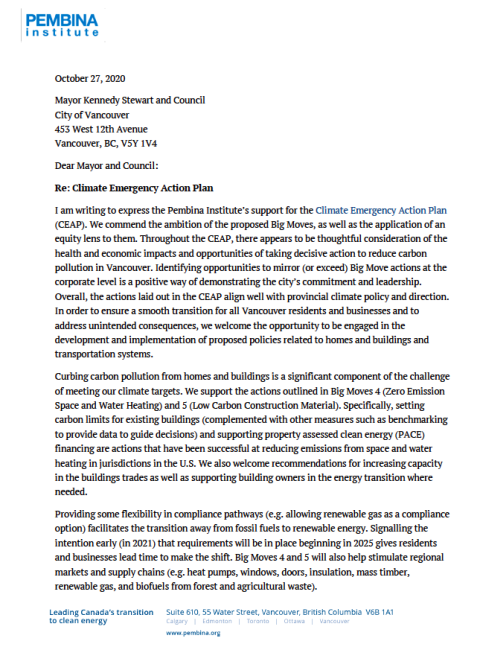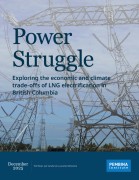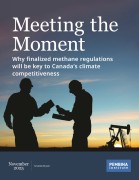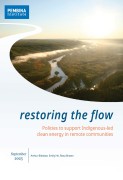The Pembina Institute has sent the following letter to the City of Vancouver:
October 27, 2020
Mayor Kennedy Stewart and Council
City of Vancouver
453 West 12th Avenue
Vancouver, BC, V5Y 1V4
Dear Mayor and Council:
Re: Climate Emergency Action Plan
I am writing to express the Pembina Institute’s support for the Climate Emergency Action Plan (CEAP). We commend the ambition of the proposed Big Moves, as well as the application of an equity lens to them. Throughout the CEAP, there appears to be thoughtful consideration of the health and economic impacts and opportunities of taking decisive action to reduce carbon pollution in Vancouver. Identifying opportunities to mirror (or exceed) Big Move actions at the corporate level is a positive way of demonstrating the city’s commitment and leadership. Overall, the actions laid out in the CEAP align well with provincial climate policy and direction. In order to ensure a smooth transition for all Vancouver residents and businesses and to address unintended consequences, we welcome the opportunity to be engaged in the development and implementation of proposed policies related to homes and buildings and transportation systems.
Curbing carbon pollution from homes and buildings is a significant component of the challenge of meeting our climate targets. We support the actions outlined in Big Moves 4 (Zero Emission Space and Water Heating) and 5 (Low Carbon Construction Material). Specifically, setting carbon limits for existing buildings (complemented with other measures such as benchmarking to provide data to guide decisions) and supporting property assessed clean energy (PACE) financing are actions that have been successful at reducing emissions from space and water heating in jurisdictions in the U.S. We also welcome recommendations for increasing capacity in the buildings trades as well as supporting building owners in the energy transition where needed.
Providing some flexibility in compliance pathways (e.g. allowing renewable gas as a compliance option) facilitates the transition away from fossil fuels to renewable energy. Signalling the intention early (in 2021) that requirements will be in place beginning in 2025 gives residents and businesses lead time to make the shift. Big Moves 4 and 5 will also help stimulate regional markets and supply chains (e.g. heat pumps, windows, doors, insulation, mass timber, renewable gas, and biofuels from forest and agricultural waste).
Reducing carbon pollution from homes and buildings is a key area of the Pembina Institute’s policy work. We would be pleased to engage with the City to develop policies and programs related to Big Moves 4 and 5.
As well, the Pembina Institute is actively involved in research and analysis related to proposed policies under Big Moves 2 (Transit and Active Transportation) and 3 (Zero Emission Vehicles). We would be pleased to engage in the development and implementation of the proposed policies on transport pricing, a carbon pollution surcharge, parking, and mode shifting. We continue to be interested in complementary city-wide goods movement planning efforts such as the city’s Urban Freight Strategy and other curbside management tactics.
Sincerely,
Karen Tam Wu
B.C. director
Pembina Institute












